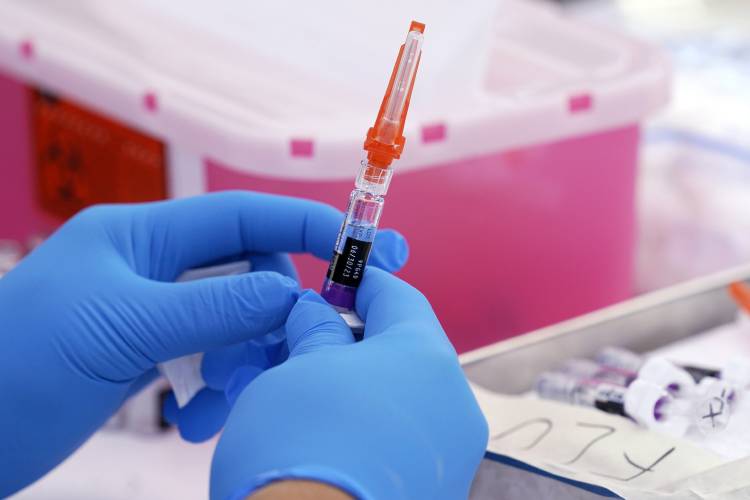Granite Geek: Battling anti-vax errors isn’t completely hopeless

A flu vaccine is readied at a community resource center in Lynwood, Calif., on Oct. 28, 2022. Mark J. Terrill / AP file
|
Published: 12-13-2023 2:15 PM
Modified: 12-15-2023 2:27 PM |
I went to a vaccine conference at Dartmouth last week to learn more about the most depressing piece of research I’ve ever encountered. Amazingly, I came away a tiny bit more optimistic.
The ongoing research by Brendan Nyhan, a professor of government at Dartmouth College, and his colleagues concerns how best to respond to people when misinformation and outright lies have convinced them to believe something that isn’t true. Faked moon landings, autism from vaccines, stolen elections; there’s no shortage of examples.
Their research over the past couple of years shows that the obvious response to people spouting nonsense – tell them the actual facts – does little to change their minds. And here’s the really depressing part: Sometimes it even makes them double down on the mistake.
In a taped talk at the conference, Nyhan pointed to a Vermont study that gave parents messages about the safety and efficiency of various vaccines, only to discover that it made some of them less likely to vaccinate their children. Yes, less likely!
It seems that when presented with information that blows apart a cherished idea, the cognitive response from many people runs along the lines of “You wouldn’t be arguing against this if there wasn’t something to it!” The harder you try, the more they dig in their heels.
Speaking as somebody who has spent his career trying to present correct facts to help people make sensible decisions, this research leaves me down in the dumps. I’m not alone.
Nyhan’s presentation discussed this topic Thursday at the Dartmouth International Vaccine Conference before a conference room with close to 200 researchers, clinicians and policy makers. These folks have spent their adult life improving drugs that can keep us safe from some truly god-awful diseases, only to watch the pushback against COVID-19 vaccine mandates undermine their work.
When Nyhan emphasized the difficulty of changing that attitude – “there are no magic messages” he warned – you could feel the whole room slump in dismay.
Article continues after...
Yesterday's Most Read Articles
 With Concord down to one movie theater, is there a future to cinema-going?
With Concord down to one movie theater, is there a future to cinema-going?
 “It’s beautiful” – Eight people experiencing homelessness to move into Pleasant Street apartments
“It’s beautiful” – Eight people experiencing homelessness to move into Pleasant Street apartments
 No deal. Laconia buyer misses deadline, state is out $21.5 million.
No deal. Laconia buyer misses deadline, state is out $21.5 million.
 Quickly extinguished fire leaves Concord man in critical condition
Quickly extinguished fire leaves Concord man in critical condition
 Concord police ask for help in identifying person of interest in incidents of cars being keyed during Republican Party event
Concord police ask for help in identifying person of interest in incidents of cars being keyed during Republican Party event
 Update: Victim identified in Lantern Lane fire in Concord
Update: Victim identified in Lantern Lane fire in Concord
So where did my little bit of optimism come from? The HPV vaccine.
This vaccine against human papillomavirus, which can cause a really nasty form of cervical cancer, received massive opposition when first rolled out because it is associated with teenagers having sex. You know that anything involving sex brings out the cancel crowd, clutching their pearls and spouting self-righteous indignation.
“The initial HPV vaccine rollout was a disaster,” Nyhan said. “But since then HPV vaccination has been normalized very successfully, working through conventional channels in a manner that builds trust, often through people’s doctors and pediatricians.”
This is the key to vaccine acceptance, he said: Have trusted sources give people information about safety and effectiveness, rather than government statements or dubious hacks like newspaper columnists.
“It’s important to reach people through sources they trust. I would especially highlight the role of healthcare workers, who are the most trusted sources of information about vaccines, Americans tell us again and again,” Nyhan said. A calm explanation from a nurse can do more than a million wordy pamphlets. “That’s the same kind of approach we should be taking on vaccinations now.”
So maybe, he said, as things cool down and people find new erroneous ideas to rant about, COVID vaccines will become as standard as other vaccines. Maybe.
The key word in all this, of course, is “trusted.”
“The only way to get trust is to be trustworthy .. and it takes time to demonstrate that,” said Barney Graham of the Morehouse School of Medicine in Atlanta during his presentation about development of the new RSV vaccine. (Incidentally, little kids and senior citizens should get this vaccine because the respiratory disease sounds nasty.)
Graham warned that losing trust is easy. He pointed to development of early types of RSV vaccines, which killed two babies in initial tests for reasons that it took a decade of basic science research to understand. The families of those babies were never told the truth and you can be sure the anti-vax crowd will use this as a reason to doubt all vaccinations.
Even with trusted sources, however, there’s a drawback: time. When a pandemic hits we can’t wait a half-decade for calm discussions to convince people who have been deluded by YouTube.
And many health-care workers are exhausted by the amount of time they have to spend responding to angry foolishness instead of doing medicine. That’s part of the reason we’re seeing shortages in the field, especially of nurses on the front line of defense against the know-nothing assault.
Remember, I said my new optimism is tiny. Still, tiny is better than none!


 Voice of the Pride: Merrimack Valley sophomore Nick Gelinas never misses a game
Voice of the Pride: Merrimack Valley sophomore Nick Gelinas never misses a game With less than three months left, Concord Casino hasn’t found a buyer
With less than three months left, Concord Casino hasn’t found a buyer Kearsarge Middle School drone team headed to West Virginia competition
Kearsarge Middle School drone team headed to West Virginia competition Phenix Hall, Christ the King food pantry, rail trail on Concord planning board’s agenda
Phenix Hall, Christ the King food pantry, rail trail on Concord planning board’s agenda
